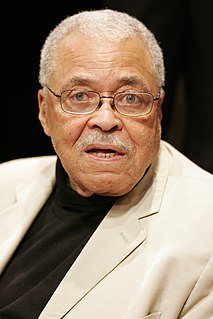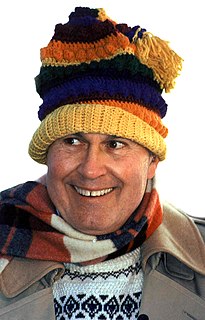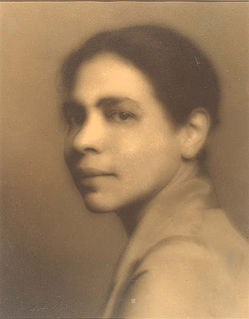A Quote by James Earl Jones
My grandmother though, began to prepare in her own neurotic - and I think psychotic - way to face racism. So she taught us to be racist, which is something I had to undo later when I got to Michigan, you know.
Related Quotes
We always talk about how, obviously, there is still very in-your-face aggressive racism. But there's a lot of passive racism that, in the moment, you don't even realize is racist. You chalk it up as a strange interaction you had, and then you look at the context of it later on and realize the root of it was racism.
I was raised by a single mom who had to put herself through school while looking after two kids. And she worked hard every day and made a lot of sacrifices to make sure we got everything we needed. My grandmother, she started off as a secretary in a bank. She never got a college education, even though she was smart as a whip. And she worked her way up to become a vice president of a local bank, but she hit the glass ceiling. She trained people who would end up becoming her bosses during the course of her career.
My mom teaches sixth grade and also taught first grade at one point. She's into dressing up and costumes and designing her own curriculum that way. She stayed home for about eight years with me and my sister when we were young before going back to teaching, so we had a lot of time with her. She taught us to read really early.
The world taught women nothing skillful and then said her work was valueless. It permitted her no opinions and said she did not know how to think. It forbade her to speak in public and said the sex had no orators. It denied her the schools, and said the sex had no genius. It robbed her of every vestige of responsibility, and then called her weak. It taught her that every pleasure must come as a favor from men and when, to gain it, she decked herself in paint and fine feathers, as she had been taught to do, it called her vain.
When I was a child and I was upset about something, my mother was not capable of containing that emotion, of letting me be upset but reassuring me, of just being with me in a calming way. She always got in a flap, so I not only had my own baby panics, fears and terrors to deal with, but I had to cope with hers, too. Eventually I taught myself to remain calm when I was panicked, in order not to upset her. In a way, she had managed to put me in charge of her. At 18 months old, I was doing the parenting.
Somewhere, within her, in a deep recess, crouched discontent. She began to lose confidence in the fullness of her life, the glow began to fade from her conception of it. As the days multiplied, her need of something, something vaguely familiar, but which she could not put a name to and hold for definite examination, became almost intolerable. She went through moments of overwhelming anguish. She felt shut in, trapped.
Ultimately I think I learned a lot from my mother - the way she used fashion to make herself feel better; it was a tool she had and she used it very well. Fashion for her wasn't so far as an escape, but certainly a time where she would sit on her own and prepare what she wanted to wear the next day - it turned into bit of a ritual.
My grandmother was a huge influence on me. She allowed me to be my flamboyant self as a kid. She babysat me; auditions came later - by later, I mean six years old. She sang and played piano, and I'd sit beside her. I don't know how confident I am, but I think you need it to survive in this industry.


































